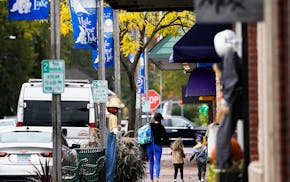Linda Lindemann can't believe she and her husband are being asked to fork over $685.44 to help her townhouse development deal with the economic crisis.
"I was very upset. I thought, "We don't have that kind of money,'" said Lindemann, whose family already pays $114 in monthly fees for their property in White Bear Township. "I didn't think they could charge us for other delinquent homeowners. Is this legal?"
It is, according to national and local experts. The only source of revenue for a homeowners association comes from the homeowners. And when some homeowners don't pay, the rest have to pick up the tab. In this case, owners are covering losses caused by foreclosures, delinquent dues and other expenses at the Brandlwood Farms Country Town Homes Association.
"An association has to do what it has to do," Twin Cities attorney Phaedra Howard said. "Nobody wants to do it because the board members [who are also homeowners] have to pay it too. But they have a fiduciary obligation to the entire association and the members to take care of things, do what needs to be done and pay the bills."
In Lindemann's case, the Brandlwood Farms board of directors approved the special assessment in March and gave homeowners the option of paying it in full by April 30 or in three installments. In some cases, the association has considered alternative payment plans when requested by a homeowner, according to attorney Thomas Carlson, who represents the association and provided a written statement to Whistleblower's inquiry.
"The assessment was the result of difficult financial circumstances over the past several years, including numerous mortgage foreclosures against units in the association and a significant delinquency rate among the association members," Carlson said in his e-mail.
Carlson said associations often are responsible for maintenance and repairs, as well as other expenses, including insurance, utilities and garbage removal.
"These services are obviously not free," Carlson wrote. "They are expenses shared by the owners/members of the association. ... When some owners fail to pay their assessments, the resulting financial burden, unfortunately, often falls on the other owners."
Frank Rathbun, spokesman for the national Community Associations Institute, said some associations budget for delinquencies. "Once this crisis took hold and people lost jobs and homes were foreclosed, a delinquency rate that might have been 2, 3 or 4 percent is now 10, 15 or 20 percent," he said. "That changes the whole dynamics and puts the association and homeowners who are paying their fair share in a very difficult position."
Lindemann said she immediately raised concerns about the special assessment, calling Mayday Management Co., which manages the townhouse development and responded to some of her concerns. In August, she reiterated her complaint and requested additional information in a written letter, disputing the assessment. As of last week, she said, she hasn't received a response.
"I've lost sleep over this," said Lindemann, who works in a bank and moved into the development three years ago. She said she merely wants documentation that the assessment is legal, a payment plan she can afford and a guarantee that this is a one-time assessment. "I don't want this to happen again," she said.
Lindemann said a management company representative informed her that the association doesn't expect to levy another special assessment anytime soon. But Lindemann said she was told there was no guarantee.
"It's just the way the economy is," said Twin Cities attorney Fredrick Krietzman, whose clients include homeowner associations.
"You have to understand that you're part of a community and you're subject to decisions by a board who you elect," Krietzman said. "Some people don't think about it going into a community."
Mary Lynn Smith • 612-673-4788

Shop the curbs for free on 'Trash to Treasure Day' in White Bear Lake

Longtime Uptown boutique closing in May

Meet the Athena Award winners: 103 female athletes honored by their schools

Lacrosse lists: 21 top players and the school that's No. 1 for boys and girls
